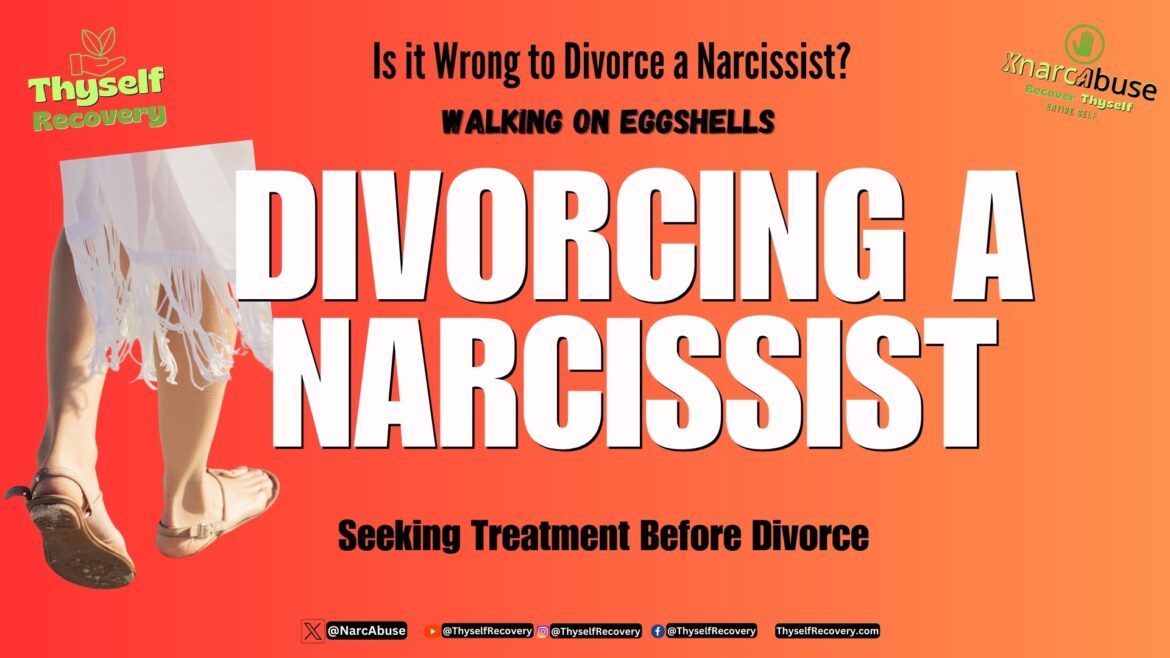Is it Wrong to Divorce a Narcissist?
Exploring Moral Obligations in Narcissistic Marriages
Most wedding vows are based around lifelong loyalty, care, compromise, and growth. But life with a narcissist denies the possibility of mutuality. Their disorder undermines these vows from the start. Still, some try to uphold moral ideals by:
- Excusing their behaviors and believing they will change
- Silencing themselves to keep the peace
- Compromising their dignity to avoid conflict
- Sacrificing their needs for the relationship
However, this actually enables narcissistic abuse. True morality requires self-care and assertion when mistreated. Partners must weigh if unconditional acceptance of abuse breaches their own ethics.
Evaluating Quality of Life With a Narcissistic Spouse
Victims of narcissists often suffer:
- Chronic stress from walking on eggshells
- Depression and anxiety from unrelenting criticism
- Loss of self-identity from ceding to the narcissist’s demands
- Isolation from the narcissist sabotaging outside relationships
- Neglect of personal needs and deterioration of health
At a certain point, remaining with a narcissist undermines basic well-being and dignity. In such cases, some ethical theorists argue divorce becomes a moral necessity.
Safety First When Leaving Narcissists
In severe cases involving threats, violence, and extreme control, divorce may be essential to protect oneself and any children from harm. Maslow’s hierarchy places safety as the foundational human need. Preserving physical and emotional security justifies divorce despite society’s edicts to “keep the family together.”
Religious Perspectives on Divorcing Narcissists
Some Christian principles like forgiveness and perseverance through hardship discourage divorce. But passages noting abuse and adultery make exceptions. Theologians argue:
- One must determine if the situation involves “treachery” vs normal marital issues.
- Treachery violates the marriage covenant, nullifying divorce prohibitions.
- Partners should seek restoration but not enable abuse through unconditional acceptance.
Is it Wrong to Divorce a Narcissist XNarcAbuse ThyselfRecovery
Examining Your Own Role in the Marriage
Victims should also look inward. Flaws like:
- Enabling behaviors
- Codependency
- Poor communication habits
- Reactivity
Likely contributed to marital deterioration too. Taking ownership can help in future relationships. However, this does not excuse the narcissist’s choices.
Seeking Treatment Before Divorce
In some cases, intensive therapy may improve a narcissistic marriage enough to sustain it. Success requires:
- The narcissist admitting their behaviors are unacceptable and harmful
- A therapist experienced in handling narcissistic behaviors
- Both spouses committing fully to the therapeutic process
- The narcissist displaying empathy and earnest change over time
Without narcissistic accountability and progress, therapy often fails.
The Difficulty in Judging Right Versus Wrong
Psychologists note our biases make it hard to judge complex situations ethically. Divorce often feels “wrong” due to cultural narratives. But for victims of cruelty, it can constitute self-preservation. There are no clear ethics governing when to keep trying or when to let go. It ultimately comes down to difficult personal discernment.
When Divorce Becomes the Ethical Choice
Though unjustified divorce harms society, certain serious situations make leaving morally permissible or obligatory, like:
- Chronic mental or physical abuse
- The narcissist repeatedly violating key marital vows
- Deterioration of your mental health due to toxicity and coercion
- Your spouse exhibiting no remorse or efforts to improve
Here divorce protects human dignity.
Obtaining a Moral Divorce from a Narcissist
Despite needing to escape an immoral narcissistic partner, victims can uphold virtue during separation by:
- Avoiding unnecessary lies, slander, or hostile actions
- Seeking fair distribution of assets and custody arrangements
- Speaking truth with composure when explaining reasons for divorcing
- Forgiving themselves for any shortcomings during the marriage
- Wishing the narcissist peace while firmly cutting contact
This allows victims to move forward with self-respect intact.
Conclusion
Determining the morality of divorcing a narcissist is highly complex, personal, and shaped by many philosophical perspectives. It requires weighing factors like vows, ethics, safety, well-being, and religion. While divorce often harms society, in cases of severe narcissistic dysfunction, it can become ethically necessary. By evaluating their situation comprehensively, taking accountability for any personal flaws, and proceeding with integrity, victims can divorce narcissists ethically. This path, though difficult, allows them to uphold their humanity and leave dysfunction behind.

